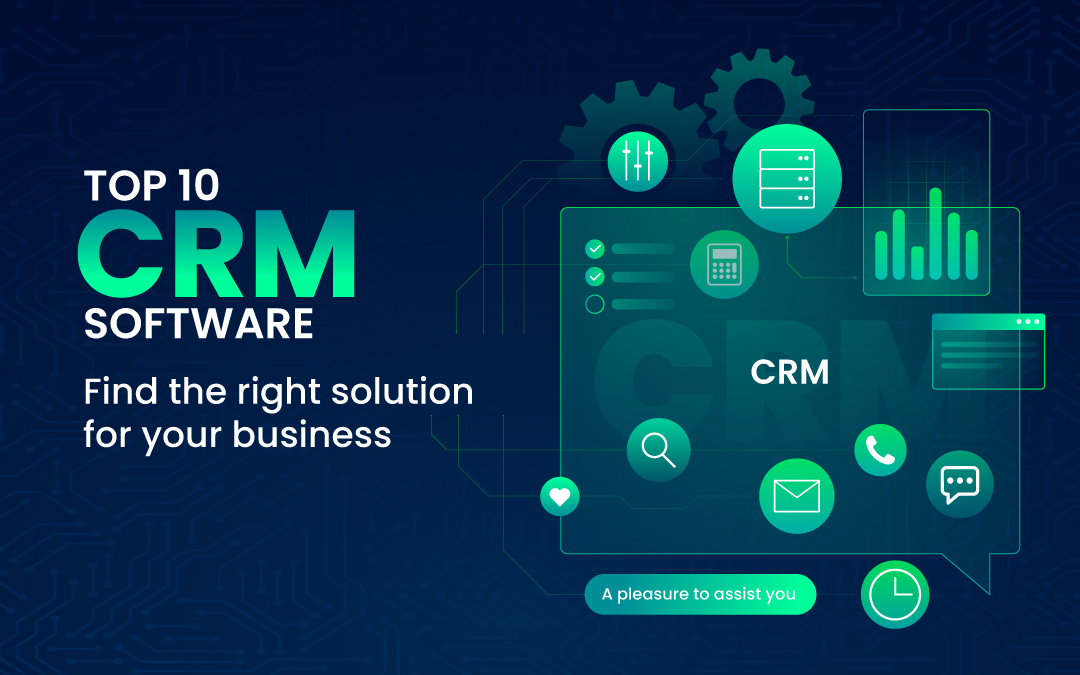
Have you ever wondered why some businesses seem to effortlessly win over customers while others struggle to keep their doors open? The secret is simple: it’s called CRM. A good tool for daily customer relationship management (hence, CRM) helps you attract more leads and nurture them into loyal customers.
Let’s explore how your business can benefit from CRM and which top solutions are currently on the market. And don’t worry — we’ll also guide you on how to choose the perfect CRM for your needs.
Why businesses need CRM software
CRM is not just a buzzword — it’s an essential tool that helps businesses compete and win the game. Here is the answer how:
- Centralized data management. CRM unifies your data. It serves as the one and only place for lead, contact, and deal management. Moreover, such an approach improves team collaboration and task management, ensuring different departments are on the same page.
- Improved customer relationships. Not only does a good CRM help you capture leads from multiple channels, it also helps you segment those leads and nurture them with personalized communication and targeted content.
- Automated sales and marketing processes. CRM automates many routine tasks that take your time and energy. These are typically data entry, follow-ups, and reporting among many others. Plus, such marketing automation minimizes the risk of human error.
- Increased sales performance. Sales teams can track leads, timely follow-up them, manage deals in sales pipelines, and monitor performance in real-time.
- Valuable customer insights. A good CRM system offers reporting and analytics to help businesses understand their customers better.
Top 10 CRM software for 2025
1. NetHunt CRM
If you’re looking for an ultracustomizable, highly intuitive, and robust Gmail CRM — check out NetHunt CRM. As a system that lives inside your familiar inbox and natively integrates with multiple tools and channels, NetHunt CRM allows you to automatically create records, manage your sales, and communicate with leads right within the platform.
User-friendly and quick to set up, NetHunt CRM is a perfect solution for small and medium businesses looking to optimize their lead generation and sales processes without getting bogged down by unnecessary complexities.
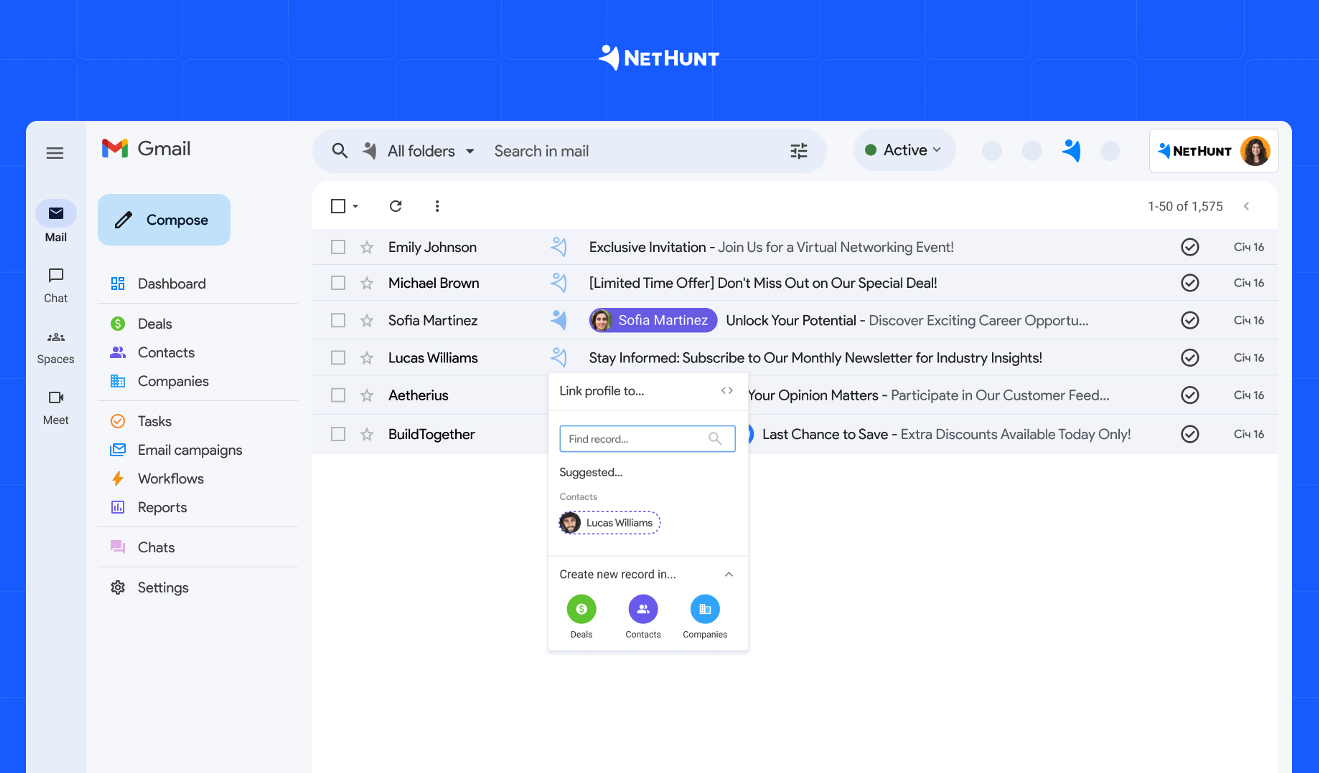
Features
- Native integration with Gmail. Manage your business in one place and forget about tab-hopping.
- Ultracustomizable workflows. Effortlessly create fields, tags, and pipelines that mirror your unique sales process.
- Automatic multichannel lead capture. NetHunt CRM automatically captures leads from multiple channels like webforms, social media, messengers, and others.
- Multichannel lead nurturing. You can nurture your leads with multichannel follow-up sequences and personalized email marketing campaigns.
- Sales pipeline automation. The system automatically moves prospects through each stage of the pipeline with triggered workflows and assigns tasks to team members based on the changes.
- Deep third-party integrations. NetHunt CRM integrates with tools you already use and love, such as messengers, social media channels, Google Workspace, and VoIP services.
- Actionable reporting. Create custom reports to track sales progress, conversion rates, and other key metrics.
Pros
- Ultracustomizable and scalable
- Easy to use and set up (the setup takes a few minutes)
- Dynamic lead segmentation
- Multiple native integrations
- Robust sales automation
- Transparent and affordable pricing
Cons
- Advanced features come as part of higher-tier plans
Pricing
Plans start at $24 per user per month, billed annually, and go up to $96 per user per month, also billed annually.
2. Salesforce
The behemoth of the CRM market, Salesforce is probably the first name that you’d hear once you decide that you need a CRM. Businesses of all sizes trust Salesforce as it is highly reliable, customizable, and has all the features that a business needs to grow.
Salesforce consists of suites aka ‘Clouds’, such as Sales, Marketing, Analytics, Service, and more. However, you don’t have to pay for each Cloud as pricing plans offer access to multiple suites simultaneously.
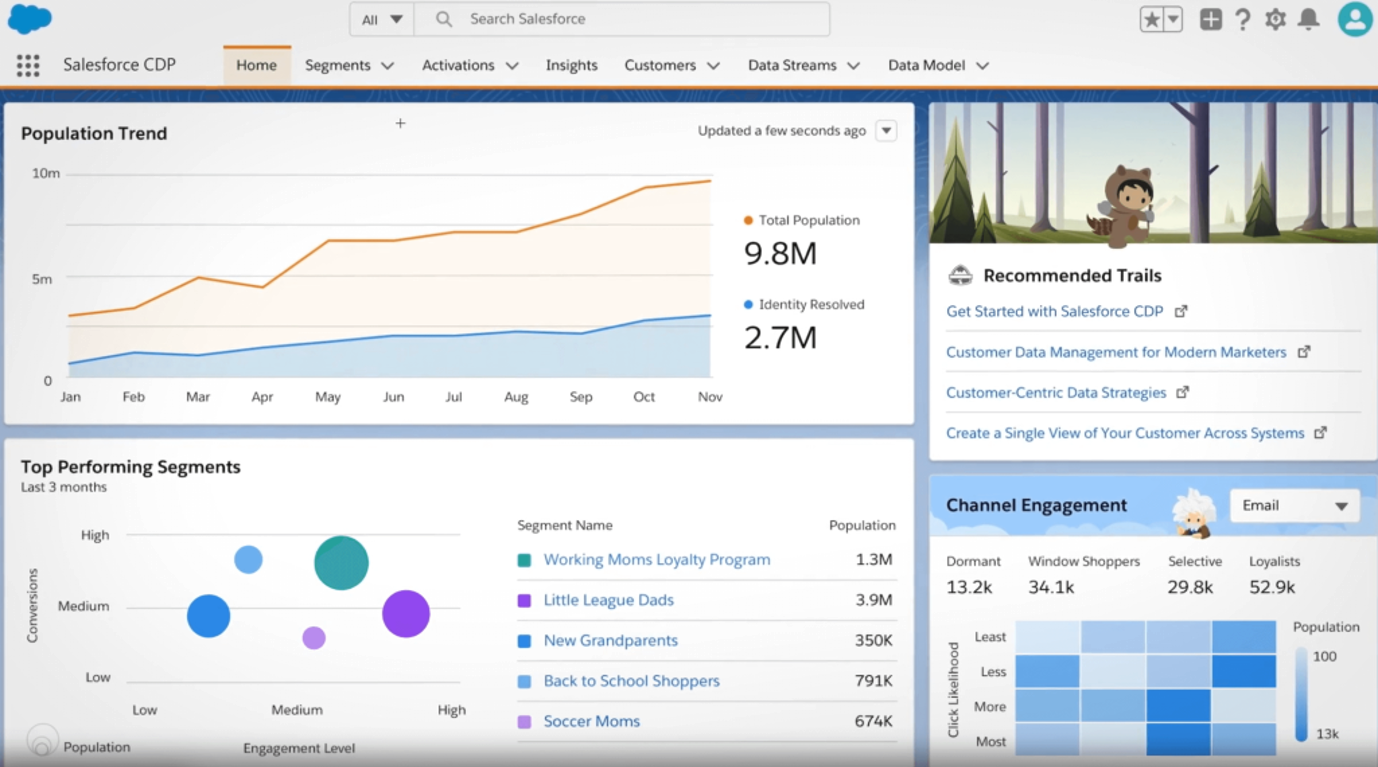
Features
- Contact, sales, opportunity, and lead management
- AI Salesforce Einstein — predictive analytics
- AppExchange — a marketplace of third-party apps to exchange your functionality
- Lightning platform — a low-code development platform for building custom tools
Pros
- Highly scalable and feature-rich
- AI predictive analytics
- Robust third-party integrations
Cons
- Can be costly for larger teams and businesses with complex workflows
- Complex and confusing to learn and use
- Customization might require significant tech expertise
Pricing
Salesforce has a very complicated pricing structure. Suite prices start at $25 (a Starter plan for small businesses) and go up to $500 for enterprises per user per month.
3. HubSpot CRM
HubSpot is famous for its user-friendly interface and heavy focus on inbound marketing. It helps you attract and nurture leads naturally rather than aggressively pushing sales. How? With its in-built content marketing tools, email marketing, and social media management.
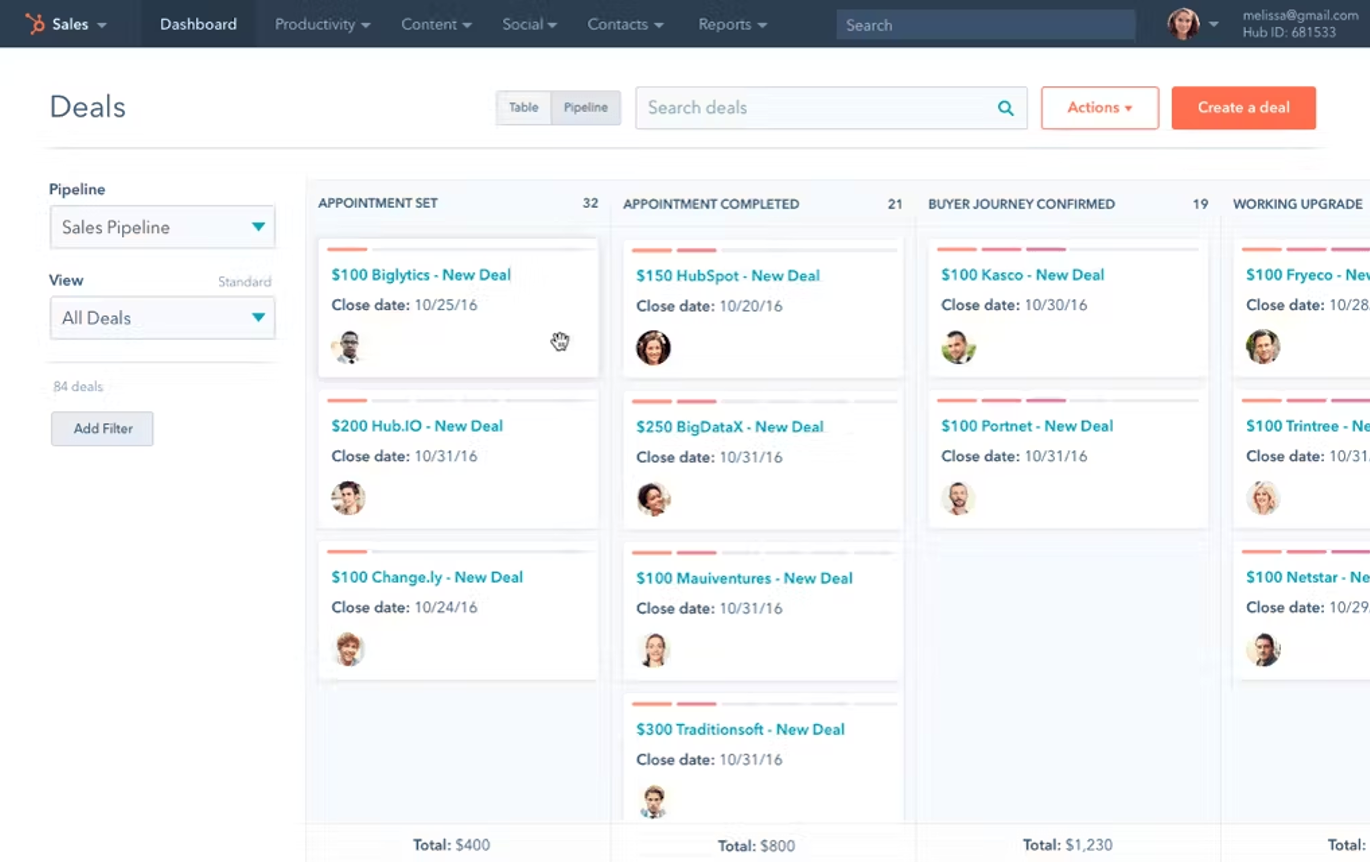
Features
- SEO recommendation tools + AI blog writer
- Forms, pop-ups, and CTAs
- Personalized email campaigns
- Automation workflows trigger emails and tasks based on customer actions
- Live chat and ticketing
- Sales and marketing analytics
Pros
- User-friendly interface
- Comprehensive inbound marketing
- Offers a free plan with basic content marketing features + AI blog writer
- Live chat and ticketing for enhanced customer support
Cons
- Less flexible and customizable compared to other options on the list
- Slower performance with large datasets
- Lower focus on outbound marketing
Pricing
HubSpot’s pricing starts at €15 per user per month an goes up to €3,3000 per month (the plan includes only 5 seats. Additional seats start at €75).
4. Zoho CRM
Another CRM solution on the list that offers comprehensive CRM functionality and is more affordable compared to industry giants like Salesforce. Zoho offers native integrations across multiple tools and stands out as a great alternative to more rigid platforms like HubSpot or Streak.
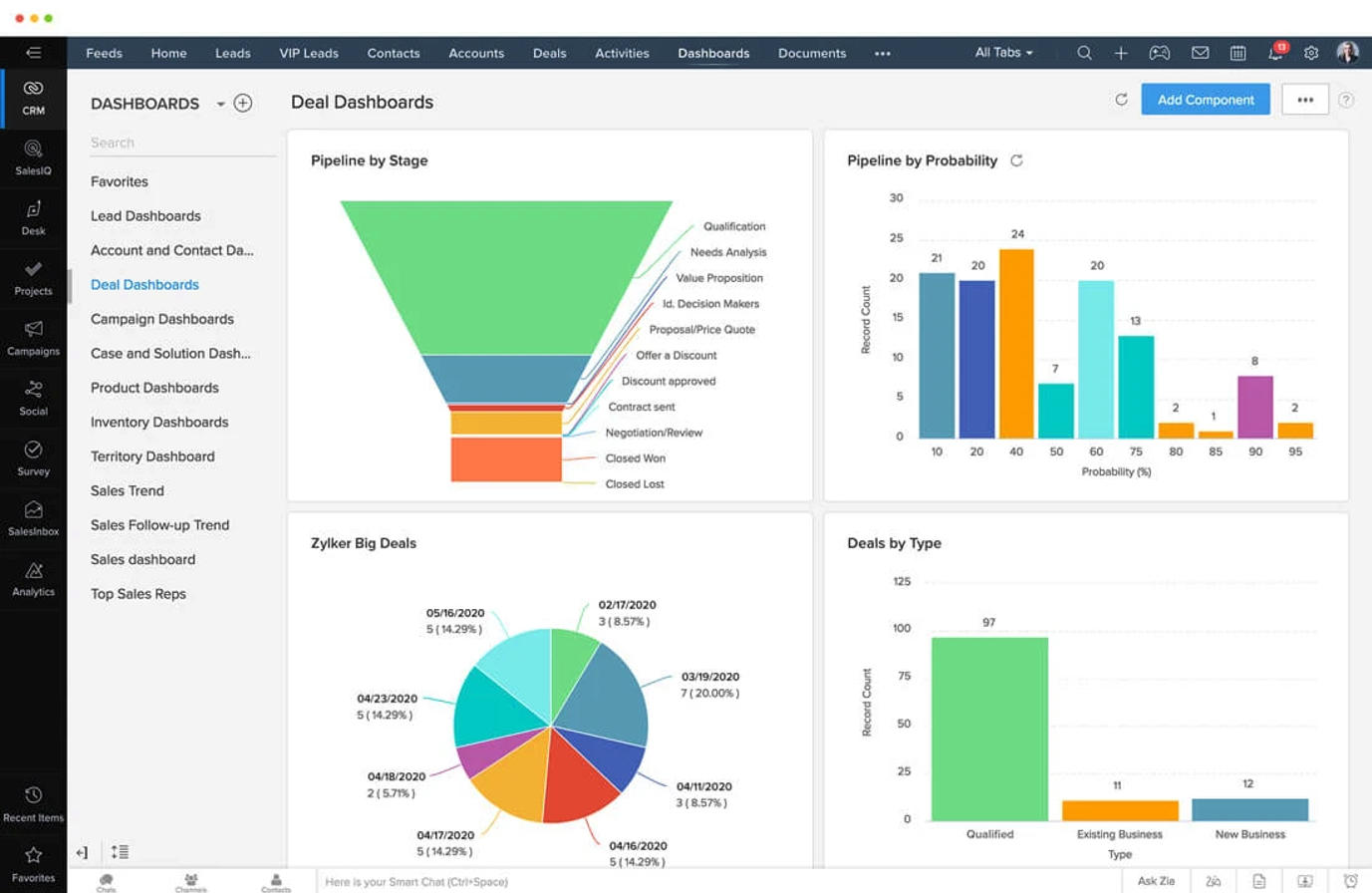
Features
- Comprehensive contact, lead, opportunity, and account management
- Robust marketing automation due to the system’s tight integration with other Zoho’s tools
- Customizable workflows
- Advanced analytics
Pros
- Flexible
- Affordable compared to more complex solutions like Salesforce
- Comprehensive feature set
Cons
- Some users report performance issues, especially when dealing with larger datasets and complex workflows
- Zoho’s complexity can be overwhelming for first-time users
Pricing
Zoho CRM’s plans start at €14 and go up to €52 per user per month, billed annually.
5. Pipedrive CRM
For years, Pipedrive used to be a sales management tool that lacked email marketing functionality till 2024. Now, it’s a comprehensive CRM tool with advanced lead, deal, and pipeline management capabilities. It offers a wider range of integrations compared to Streak or Nimble and way more customizable workflows than HubSpot.
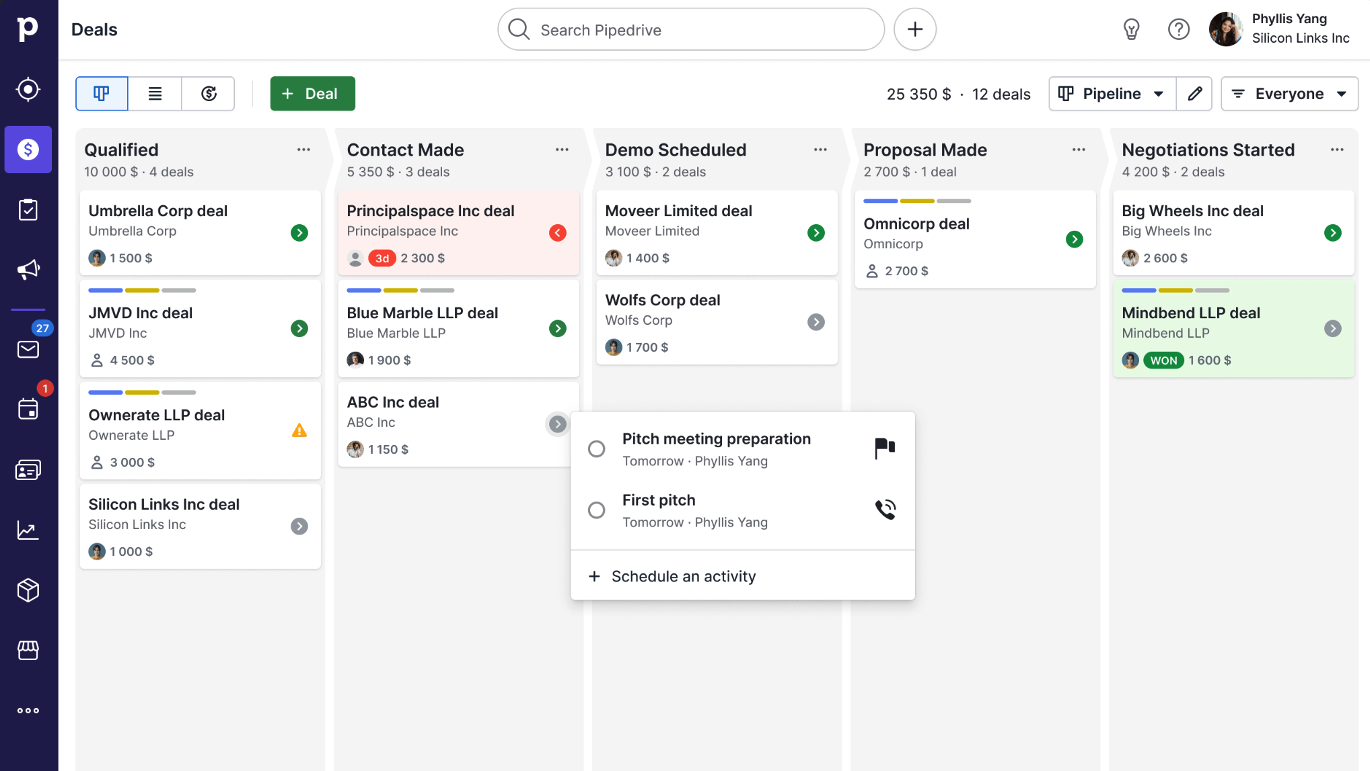
Features
- Integrates with different email providers
- Simplified pipeline management — clear and intuitive
- Lead, deal, and task management
- Email builder, Email analytics, and Email segmentation
- AI email writer and AI Sales Assistant
Pros
- User-friendly pipeline visualization
- Robust email marketing suite
- AI features
Cons
- Less robust reporting functionality
- The lack of native integrations compared to NetHunt
Pricing
Plans start at €12 and go up to €79 per seat per month, billed annually. A 14-day free trial is available.
6. Freshsales CRM
Freshsales CRM is a cloud-based solution that offers a wide range of features for managing your sales and marketing. On our list, it is the most affordable ($9 for the basic plan) and the most communications-focused tool. Plus, you get AI insights and chatbots for enhanced customer engagement and automated lead management.
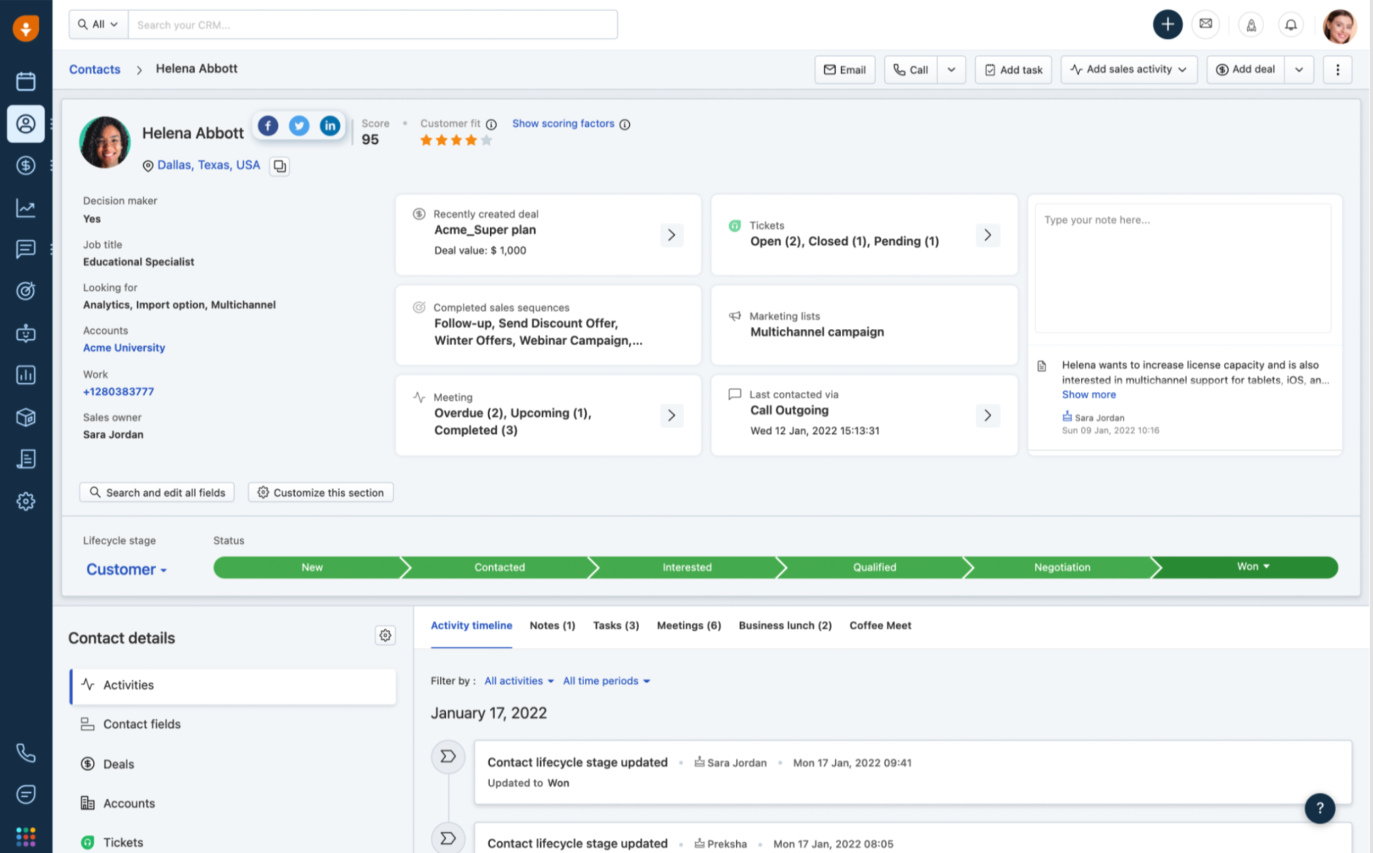
Features
- Built-in cloud telephony
- Chatbots
- Personalized email campaigns
- Freddy AI assistant for empowered lead generation and nurturing
- Integrates with other company’s products like Freshdesk and Freshservice
Pros
- User-friendly, great for beginners
- AI insights
- Comprehensive communication tools
Cons
- Some features are available as a part of higher-tier plans or separate products
- Add-on costs for extra-bot sessions
- Users have experienced challenges with social media integrations
Pricing
Plans start at $9 per user per month and go up to $59 per user per month, billed annually.
7. Workbooks CRM
Workbooks CRM has been designed to cater to specific industries such as media, IT, and professional services. Workbooks offers marketing automation, project management, and invoicing, turning your business into one ecosystem. However, the solution lacks transparent pricing and has a steep learning curve.
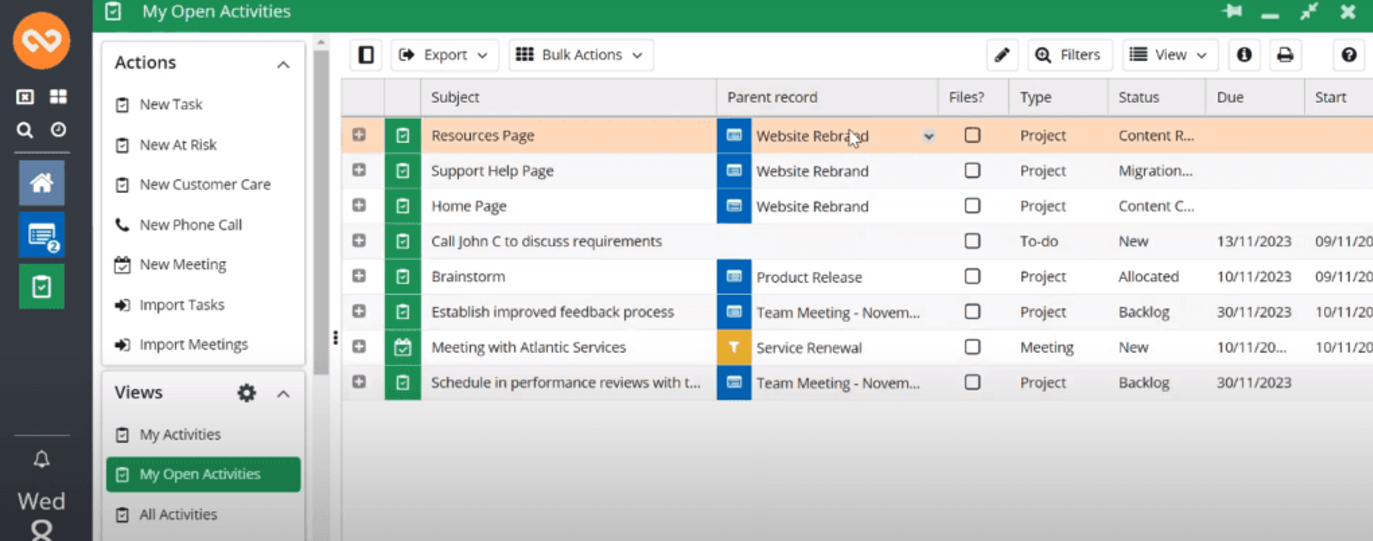
Features
- Collaboration tools
- Integrates with marketing automation, project management, and invoicing tools
- Automatic tracking and real-time reporting
- Interactive dashboards
- Customer segmentation
Pros
- Industry-specific focus
- Perfect for midsize businesses
- A less complex alternative to HubSpot or Salesforce
Cons
- Very pricey
- The lack of user-friendly interface
- The lack of native integrations
Pricing
Pricing starts at £28 per user per month and goes up to £137 per user month. However, there is a huge number of add-ons that you’ll have to pay for to get more features.
8. monday.com
In the modern CRM landscape, monday.com is highly regarded for its intuitive design and is well-known as an affordable and easy-to-use solution. It offers custom workflows, automations, and a dynamic dashboard, making it ideal for businesses of any size. Plus, AI features make monday.com even more appealing.
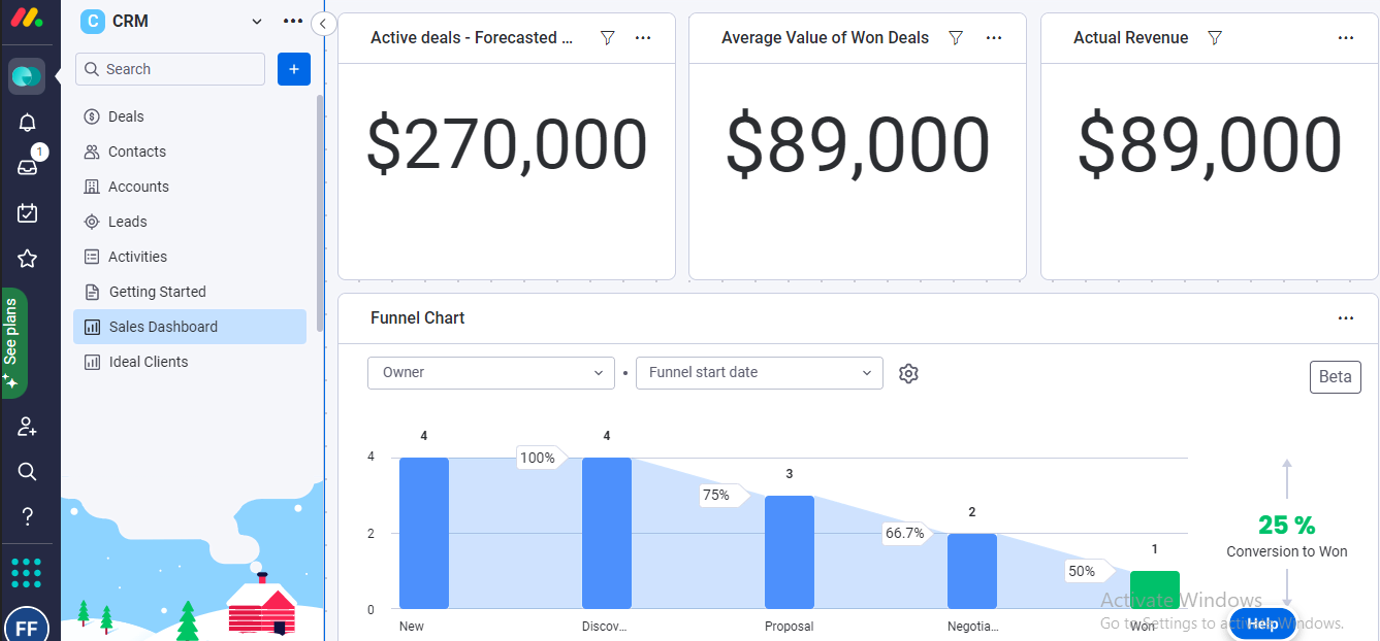
Features
- Contact, deal, pipeline management
- Time tracking
- Custom workflows and templates — offers 200+ templates for different use cases
- Color-coded views and tracking for better insights
Pros
- User-friendly interface with easy setup
- 200+ customizable templates for various workflows
Cons
- Setting up customization and automation might be challenging
- Importing and merging data from multiple sources can become challenging with larger datasets
Pricing
Prices start at $36 per user per month and go up to custom CRM pricing plans for enterprises.
9. Insightly CRM
Insightly CRM is a cloud-based platform that, compared to other CRMs on the list, focuses heavily on relationship mapping and project management. It features advanced relationship linking capabilities, allowing users to map and understand complex networks of customer interactions.
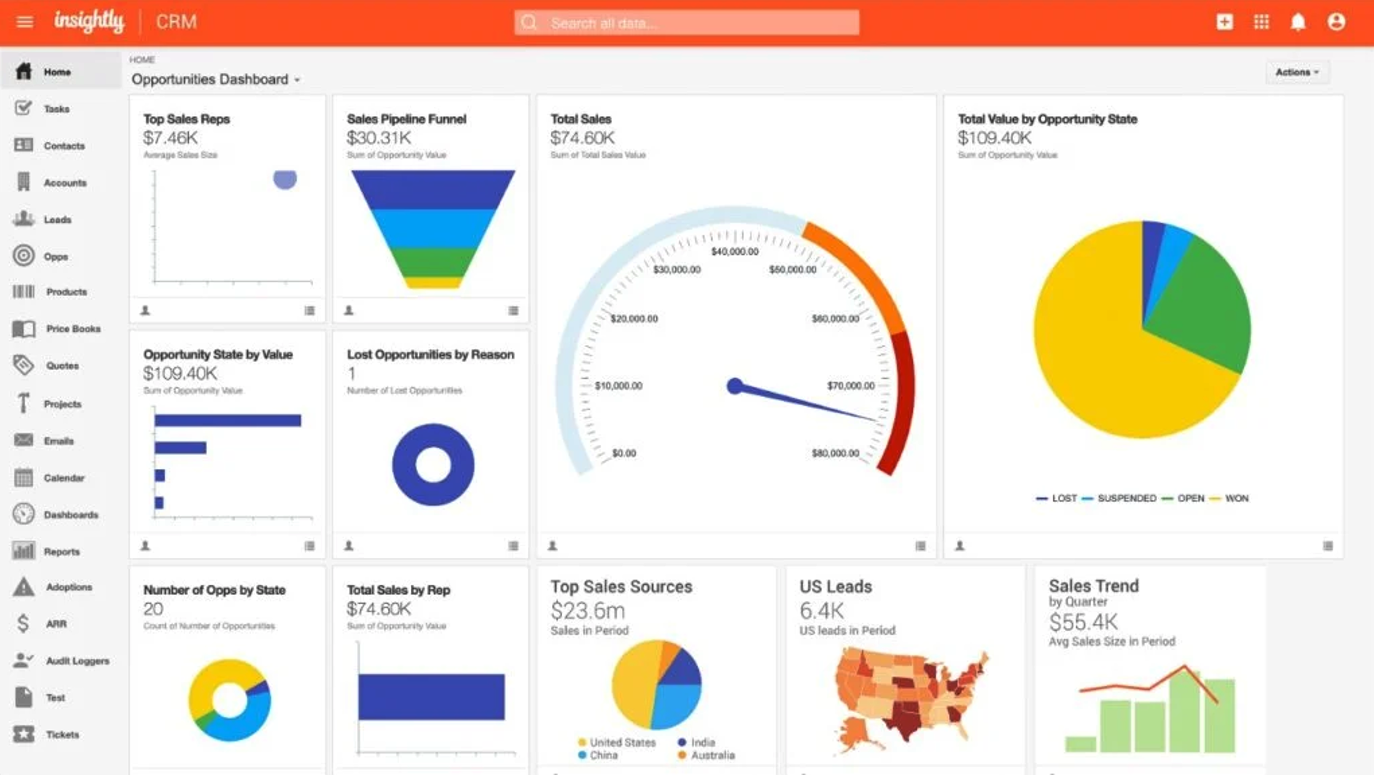
Features
- Contact, deal, pipeline management
- Marketing automation
- Relationship mapping
- Social media integration
Pros
- Multiple integrations
- Robust project management
- Custom app builder
Cons
- Limited lead scoring
- Advanced features are available in higher-tier plans
Pricing
Plans start at $29 and go up to $99 per user per month, billed annually.
10. Nimble CRM
Nimble CRM is a tool that heavily focuses on social media marketing. It integrates with social media platforms like LinkedIn, Twitter, and Facebook, helping businesses track social interactions and updates. Additionally, Nimble CRM uses a smart contact management system that pulls in data from email, social media, and calendar.
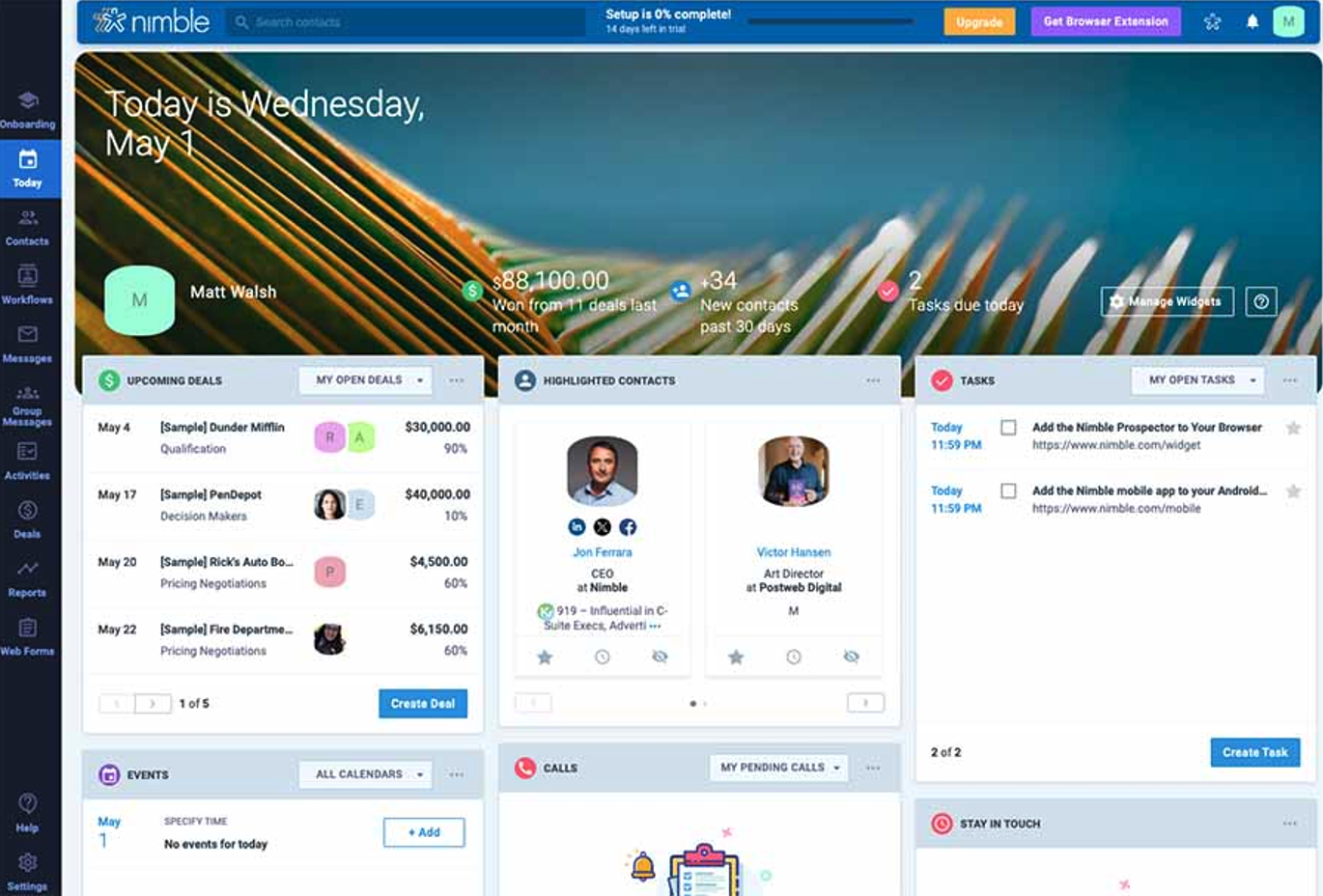
Features
- Contact, task, deal management
- Social media integration
- Built-in email marketing
- Reporting
Pros
- Advanced social media management
- Built-in email marketing functionality
Cons
- Limited customization compared to tools like NetHunt CRM or Salesforce
- Basic reporting
Pricing
Nimble offers a single pricing plan, which is $24.90 per license/month when purchased annually.
How to choose the right CRM for your business
At first, looking for your perfect CRM solution might feel like searching for a needle in a haystack. Each CRM solution would have its benefits and drawbacks. The key is to choose the one that covers your most essential business needs and scales with your business as you grow.
Assess your needs
Make a list of features that are critical to your business. We advise you to focus on the following ones, as they’re the most important — lead generation and contact management, sales automation (do you need a pipeline or a more record-based approach?), and reporting & analytics.
Consider your team size
Small teams benefit from user-friendly options without complex functionality, while larger teams definitely require CRMs with advanced project and tasks management.
Check integration capabilities
You’d benefit from a CRM that natively integrates with tools you already use and love. Be cautious with CRMs that offer third-party integrators like Zapier as they might compromise your data management.
Look for robust customization and scalability
Every business is unique. That’s why you need a CRM that allows you to tailor features, workflows, and interfaces that simplify and empower your business operations. Also, a good CRM adapts increasing data volumes, additional users, and more complex requirements without compromising performance.
Compare pricing plans
Look for transparency in pricing. Be aware of any hidden costs, such as fees for additional users, integrations, or support. We recommend signing up for a free trial to test the CRM’s capabilities and determine whether it justifies the cost.
Conclusion
A good CRM solution not only fine-tunes your current operations but also lays the groundwork for future business growth. The top 10 CRM solutions we've explored offer a variety of features and benefits tailored to fit various needs and budgets.
Regardless of the CRM you choose, always remember that investing in a CRM isn’t only about managing customer relationships; it’s about building meaningful connections that drive loyalty and growth.
 FAQs
FAQs
CRM (Customer Relationship Management) software is a digital solution that helps businesses manage their interactions with current and potential customers. It centralizes customer data, optimizes sales & marketing processes, and automates daily tasks such as sales tracking, marketing campaigns, and customer support.
CRM best for small businesses offers a low learning curve, easy setup, intuitive interfaces, easy integration with existing tools, and affordability. The best CRM for small businesses often depends on specific needs and budget, but popular options include NetHunt CRM, HubSpot CRM, and Zoho CRM.
CRM software improves customer relationships by offering a 360-degree view of customer data such as customer profile, behavior, purchase history, and preferences. By using this data, businesses can build a personalized sales & marketing strategy that resonates with each customer. Plus, a CRM system centralizes customer data, which means that customer support teams can resolve issues faster.
Related Posts
Share this post
Leave a comment
All comments are moderated. Spammy and bot submitted comments are deleted. Please submit the comments that are helpful to others, and we'll approve your comments. A comment that includes outbound link will only be approved if the content is relevant to the topic, and has some value to our readers.


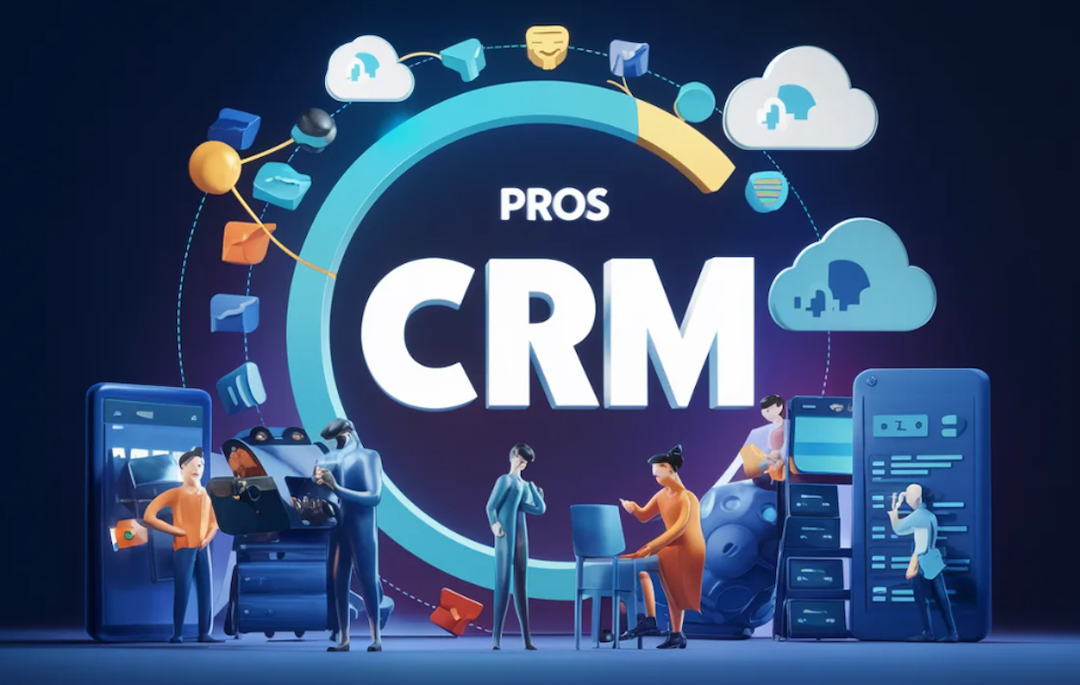
Comments (0)
No comment